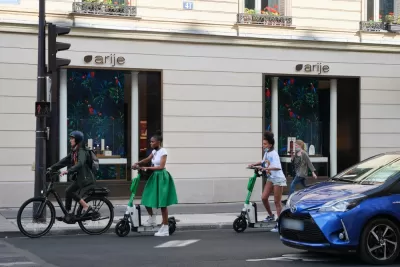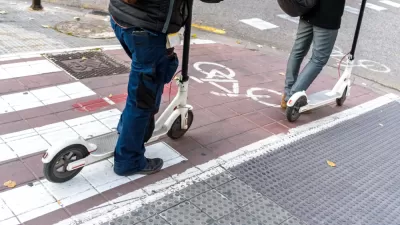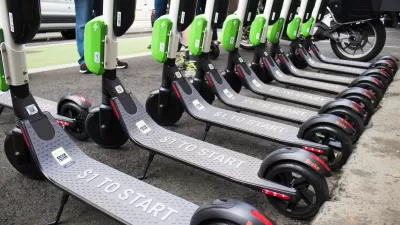The nascent electric scooter rental industry came close to total collapse during the pandemic, but riders are back in bigger numbers than ever and the companies hope to build momentum on growing concerns about the climate impacts of transportation.

Ridership of electric scooter rental services have rebounded to pre-pandemic levels in 2022, riding a wave of interest built into the significant changes in daily routines since Spring 2020.
An article by Ira Boudway for Bloomberg describes the rebranding of electric scooter rental companies amidst the cultural shift, namely, that companies are framing their services as a key tool in efforts to reduce greenhouse gas emissions from the transportation industry.
Lime CEO Wayne Ting is quoted in the article saying the company should gain more transportation market share as “it becomes clear to people that replacing large, privately owned gas-powered cars with large, privately owned electric vehicles won’t be enough to address the climate crisis.”
Even without the cultural shift required to prove that prediction true, electric scooter rental companies are clearly rebounding from pandemic declines. According to the article, scooter companies were in financial dire straits at the outset of the pandemic, but they began to turn the tide in 2022, when loosening pandemic restrictions and new financial support provided a boon to the bottom line of scooter operations.
“The number of trips taken in the first three months of this year is up 75% over the same period last year, bringing the company roughly back to where it was in 2019, though those trips are spread over more cities. In March, Lime crossed 300 million cumulative trips worldwide,” according to Boudway.
More details of the current financial situation f Lime and Bird, and next steps for the companies, can be found in the source article below.
FULL STORY: Are We Still Doing Scooters?

Planetizen Federal Action Tracker
A weekly monitor of how Trump’s orders and actions are impacting planners and planning in America.

Map: Where Senate Republicans Want to Sell Your Public Lands
For public land advocates, the Senate Republicans’ proposal to sell millions of acres of public land in the West is “the biggest fight of their careers.”

Restaurant Patios Were a Pandemic Win — Why Were They so Hard to Keep?
Social distancing requirements and changes in travel patterns prompted cities to pilot new uses for street and sidewalk space. Then it got complicated.

Platform Pilsner: Vancouver Transit Agency Releases... a Beer?
TransLink will receive a portion of every sale of the four-pack.

Toronto Weighs Cheaper Transit, Parking Hikes for Major Events
Special event rates would take effect during large festivals, sports games and concerts to ‘discourage driving, manage congestion and free up space for transit.”

Berlin to Consider Car-Free Zone Larger Than Manhattan
The area bound by the 22-mile Ringbahn would still allow 12 uses of a private automobile per year per person, and several other exemptions.
Urban Design for Planners 1: Software Tools
This six-course series explores essential urban design concepts using open source software and equips planners with the tools they need to participate fully in the urban design process.
Planning for Universal Design
Learn the tools for implementing Universal Design in planning regulations.
Heyer Gruel & Associates PA
JM Goldson LLC
Custer County Colorado
City of Camden Redevelopment Agency
City of Astoria
Transportation Research & Education Center (TREC) at Portland State University
Camden Redevelopment Agency
City of Claremont
Municipality of Princeton (NJ)





























